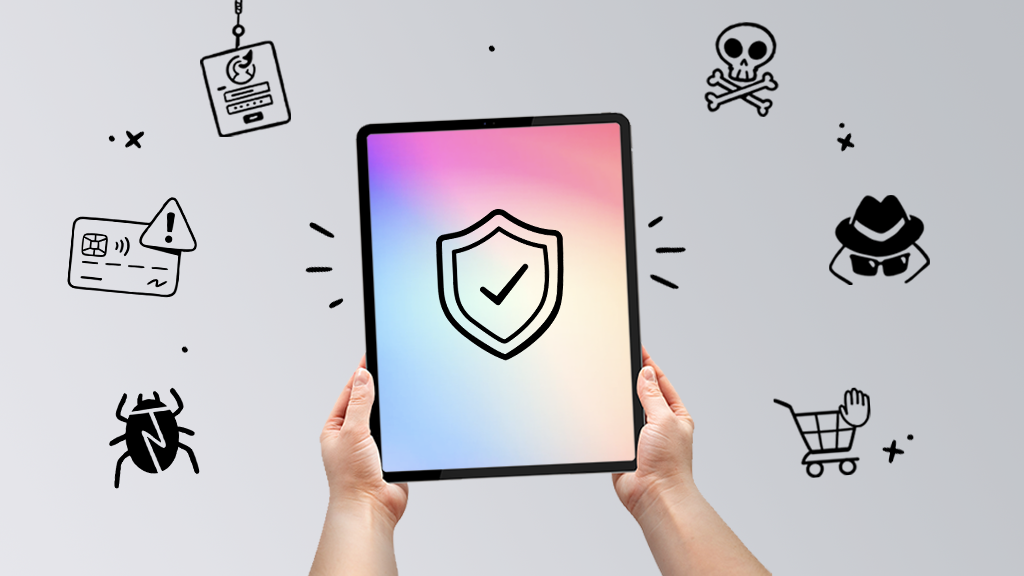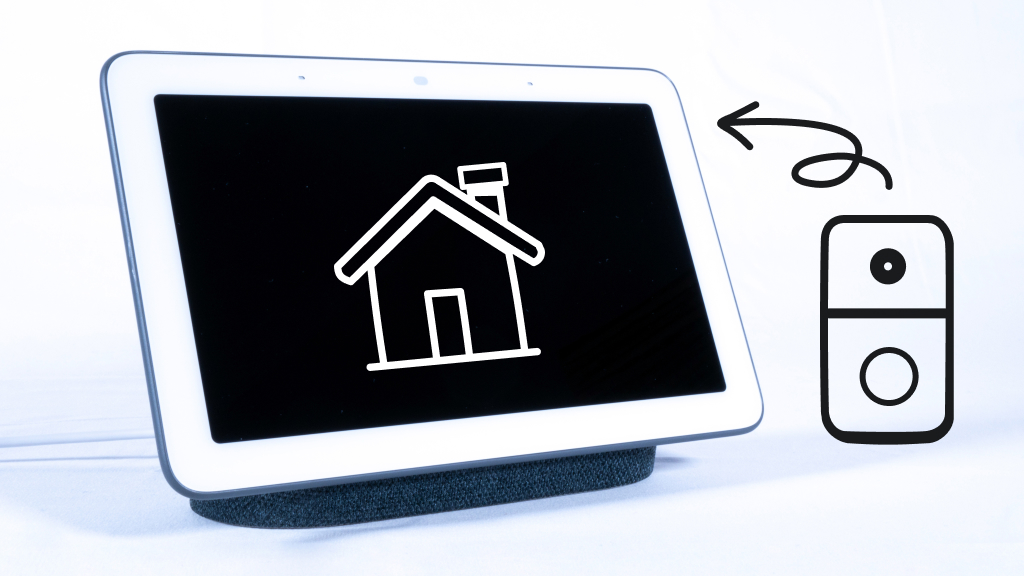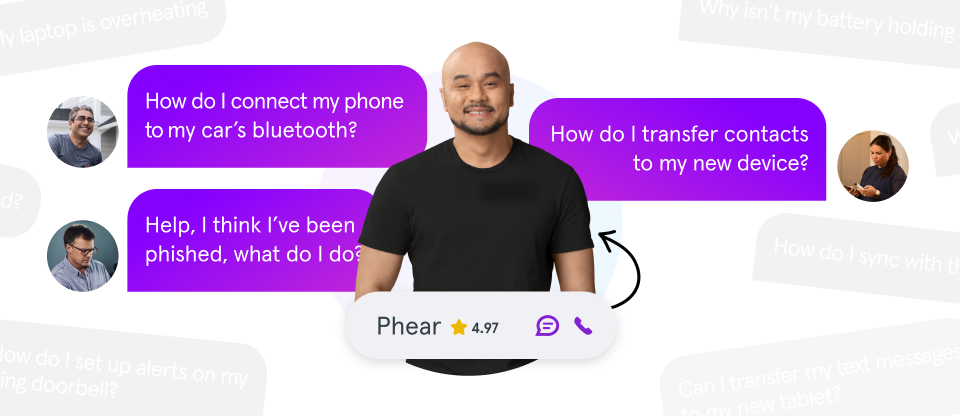Whether you're scrolling through Instagram®, buying a jacket online, or looking for love on a dating app, chances are you'll encounter a scammer trying to steal your money, your data, even your identity.
Cybercriminals are as old as the internet, but the problem seems to be getting worse. According to a 2022 report from the Better Business Bureau (BBB), the number of online scams has risen by 87% since 2015.
The good news is there are some simple ways to protect yourself. At Asurion, we help millions of people take care of their tech, from preventing cybercriminals from stealing your money to stopping annoying spam text messages. Here's how to tell if someone is scamming you online—and what to do next.
5 types of common online scams
Internet scams usually start online—via email, text, and social media. But sometimes, they come in the form of a physical letter or phone call that directs you to a website. We'll break down the different types of online scams and how you can identify them so you can better protect yourself.
1. Phishing
Phishing scams are the most common type of scam. Scammers contact you via email, text, social media, and other services to bait you into giving them your money, passwords, and other personal information. This scheme mostly relies on fear and deception. Some scammers pretend to be a friend or family member to convince you to download a file. Others direct you to a fake website with an urgent message such as “your information has been compromised."
Whatever you do, don't click on any links, don't download any files, and don't respond in any way. Just delete the message.
To learn more, check out our guides to how to spot phishing emails and how to avoid spam texts.
2. Online shopping scams
If you see an online sale on Facebook that seems too good to be true, it probably is. Retail cybercrime is the most common type of online hoax, according to the BBB, accounting for 30% of all reported internet scams.
Here's how it works: Online scammers create fake websites and advertise them on social media sites to lure shoppers with bogus sales on luxury products, like clothing, jewelry, and tech.
Sounds easy to spot, right? Not so much. The BBB report found that just over 71% of people who encountered these scams lost money.

Don’t waste time scrolling
Life is short. Ask our experts and get answers now.
3. Banking scams
Online banking scams occur when a cybercriminal tricks you into giving them access to your bank account. This can happen via phishing. Or it can happen in other ways, including:
- Brute force attacks. A scammer attempts to guess or steal the password to your bank account using a technology that guesses billions of passwords every second. If they're successful, they can transfer your money to their own account, make purchases, and open credit cards in your name. (The stronger your password, the harder it is to crack.)
- Malware attacks. A hacker sends you an attachment or link that, if clicked, downloads malware onto your device. The result? Scammers gain access to your data, which they can use to access your bank accounts.
- Man-in-the-middle attacks. You log in to your online bank account while on public Wi-Fi, like at an airport, hotel, or coffee shop, exposing yourself to scammers on the open network.
4. Impersonating family members or employers
Have you ever gotten an urgent email or Facebook message from someone you trust—a cousin, a friend, a coworker—asking you for money? Maybe they've been arrested. Maybe they've been stranded in another country or diagnosed with a deadly disease. Whatever it may be, chances are it's a scammer who has created a fake account or taken over a real one to steal your money. If your gut says the message is suspicious, it probably is.
5. Online dating and romance scams
Not even love is safe from scammers. On dating apps and websites, catfishing is a common scam in which internet swindlers use fake profiles to woo you with romance. Their goal is to gain your trust, then ask you to pay for a plane ticket or bogus medical bills.
Other dating scammers simply gather enough personal info about you to break into your accounts. Think about it: If someone learns the name of your dog—and your dog's name is part of the password to your bank account—they might be able break in without much effort.
6. Gift card scams
Scammers might pose as someone from a trusted organization or a distressed loved one, urging you to quickly purchase gift cards for a supposed emergency or legal threat. They often insist you provide the card numbers and PINs immediately, staying on the line while you make the purchase to ensure compliance.
This method is favored by fraudsters because it's hard to trace and almost impossible to reverse, allowing them to drain the funds swiftly.
7. Tech support scams
In tech support scams, fraudsters might claim to be from a renowned tech company, alerting you to a severe virus or security issue on your computer. Alternatively, they exploit the absence of official support channels, like Cash App not having a direct tech support number, leading individuals to inadvertently contact fake support numbers found online.
These scammers manufacture urgency by claiming that your account faces serious security threats, then coerce you into granting remote access to your device or making payments to fix these non-existent problems, thereby jeopardizing both your money and personal data.
Online scammer red flags
Online scams are common, but there are some easy ways to protect yourself—and your personal information. Here are some common red flags to help you spot a scammer.
They offer something that seems too good to be true
If someone offers you unbelievable discounts, gifts, or prizes online, it's probably a scam.
They ask for your personal information
Never share anything about yourself, your money, or your online accounts (especially passwords) with strangers. It could be a scam. Likewise, your boss, your friends, your family, and your coworkers don't normally send you a text asking for your email password. If they do, it could also be scam.
They ask for money and to pay by unusual methods
Most people and stores ask for common forms of payment—cash, checks, Zelle®, Venmo®. But if someone on an online dating site or dating app wants you to send them money by wire transfer or crypto currency, which can't be reversed, they may be trying to scam you.
They use improper grammar
If an email, text, or website is rife with poor grammar and bad punctuation, it could be a scam. Legit companies dedicate a lot of time to making sure their websites, emails, and offers are proofread and accurate.

They don't know your full name
Any company you regularly do business with—like your school or bank—knows your full name and often uses it in their communications. If you receive a message addressed to “Dear Customer" or “Hello," it is likely a scam.
Their email address or account seems off
Scammers often use fake email addresses and accounts that appear to look like a legit company or person you know or do business with. Double check the sender's email address—if it's off by a letter or has the wrong domain name (like .net instead of .com) it's probably a hacker.
They're pushy, threatening, and play with your emotions
Cybercriminals often pressure you to buy something or divulge personal information fast. Sometimes they fake a crisis with fearmongering messages, like “Your account has been hacked!" Then they get pushy, demanding you click a link or download a file. Don't fall for it.
What to do if you think you're being scammed online
If you think you've been the victim of an online scam, report it to the Federal Trade Commission (FTC). If you gave sensitive information to a scammer or gave money to someone you shouldn't have, report the identity theft to the FTC, your financial institution, and the police.
How to avoid online scams and protect yourself
There are many ways to protect yourself from online scams. We'll walk you through them.
Do your research
To safeguard against tech support scams, always verify contact information through official company websites and conduct thorough online searches to confirm legitimacy. Utilize reverse image search to check the authenticity of any images like badges or certifications, which can reveal if they're just generic stock photos.
Be alert to common warning signs such as urgent unsolicited calls, requests for remote access, the answers to security questions, your social security number, or demands for unconventional payments. When in doubt, contact the company directly using details from their verified channels to ensure you're not communicating with imposters.
Pay safely
Before buying anything online, make sure the website you're using is legit. When you go to pay, only use secure, traceable methods like credit and debit cards.
You should also confirm that the website address you're using starts with https:// (not http://)—the “s" stands for “secure"—and has a padlock icon next to the URL in the address bar.
Finally, never send money or submit credit card information to organizations or people you aren't familiar with. For more information, read our tips on ways to keep your credit card secure.
Don't click
When you get a suspicious email, text, or ad, don't click on links or open attachments. While you're at it, don't stream content from unknown sites, either—stick to sites you know and trust.
Say no
If you get a phone call from someone asking you to grant them remote access to your computer, say no—even if they claim to be from a technology company and offer a free upgrade. They're most likely trying to install malware on your computer to nab your passwords and details.
For more tips, read our guides on staying safe online and securing your phone from hackers.
Tried these steps and still need help? We got you. Get your tech problem solved when you call or chat with an expert now.





